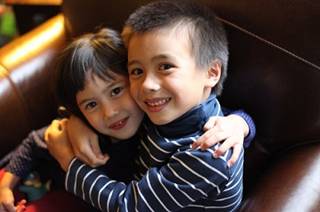| |
| |

My kids Charlotte and Cameron
|
|
Hello Fellow Parents:
The other day I looked at the list of Typical Teen Behaviors from A Parent's Guide to the Teen Brain -- and laughed knowingly. Even though my daughter Charlotte is only 4, with her love of shoes she certainly fits "style-obsessed." Can you identify any of these behaviors in your child?
Speaking of teen behaviors, parents often ask me how they can tell if their teen is just acting like a teen -- or when he or she is exhibiting a red flag behavior. For instance, let's say your son is suddenly hostile, has new friends you don't care for and has missed curfew a few times. Does that mean he is using drugs?
(Check out this list of warning signs that your child could be using drugs or alcohol.)
Some of this behavior could be normal -- as a result of his developing teen brain (new research reveals that brain development during these formative years play a significant role in shaping your teen’s personality and actions.) But if you do notice sudden changes or new patterns in your child's behavior and he or she is showing several of these warning signs all at once, then it could indicate a problem. Trust your gut here and be sure to talk to your child if you suspect something's going on.
[A good place to start is Time To Act and our Intervention e-book (pdf).]
If your child had developed a problem with drugs or alcohol, please visit our new-and-improved Time To Get Help where you can download our Treatment e-book (pdf), ask questions and connect with other parents. And if you want to speak to a licensed clinical social worker for guidance, call our new bilingual toll-free helpline (1-855-DRUGFREE).
My kids are still young, but I'm surprised how substance abuse is already on their radar.
Recently, my 6-year-old son and I waited as an older gentleman was brought onto the bus in a wheelchair and with an oxygen tank. He looked at my son and said, "Never smoke cigarettes." I explained to Cameron how the man now understands that cigarettes hurt his body. We talked about how he is not able to run or play football or do all of the things that my son enjoys. Now every time we see someone on the street smoking, he mentions him.
(Mommy Blogger Jen Singer and other experts shares these tips for talking to your kids about drugs and alcohol at all ages -- from preschooler all the way up to young adult.)
In terms of alcohol, Cameron often sees beer commercials when watching football with my husband. In fact, it's how he now knows there’s a silent G and silent H in the word "light." He even directs us to certain brands when we are grocery shopping, adding, "That’s for grown-ups."
[For tips on how to use teachable moments with your child download our Time To Talk Talk Kit (pdf).]
It's really never too early to establish good communication skills with your children. By talking to them about respecting their bodies, the joys of healthy living and making smart decisions, you're giving your child the skills to resist drugs and alcohol when he or she is older. You may find young kids just ask basic questions like "What is pot?" or "What do drugs do to someone's body?" -- and it's good that they know they can come to you for answers.
[To get the facts about the 13 most commonly-used drugs among teens and their side effects, download our Drug Guide for Parents (pdf) and our Prescription and Over-the-Counter Drug Guide (pdf).]
While addiction hasn't touched my family directly, that doesn't mean it hasn't affected me, or hasn't affected you. Your niece could be in a car with someone high on prescription medicine. Your co-worker may be panicked because her daughter was rushed to the emergency room last night. Your son's best friend may be caught up in a drug problem without the support to get help.
The resources we provide here at The Partnership at Drugfree.org are absolutely and totally free of charge, all diligently reviewed by scientists, parents and health care professionals who work on the frontlines of our issue.
I love my job. And I know that what I'm doing will help Cameron and Charlotte, help them so that they can make smart and healthy decisions in the future, and help me if I need support or guidance as their mom along the way.

Denise Young Farrell
VP, Director of Public Affairs at The Partnership at Drugfree.org
Mother of Cameron, 6, and Charlotte, 4
P.S. Watch this amazing video of Tara Conner, former Miss USA, who reflects on her experiences with drug addiction and alcoholism and learn more about our brand-new You Are Not Alone campaign.

|
|

 Red Ribbon Week will be celebrated next week (November 7-11). Most people probably know Red Ribbon week's purpose is to create awareness concerning the problems related to the use of tobacco, alcohol and other drugs. It also supports the decision to live a healthy, drug-free life style. I would like to share an article from The Partnership at Drugfree.org.
Red Ribbon Week will be celebrated next week (November 7-11). Most people probably know Red Ribbon week's purpose is to create awareness concerning the problems related to the use of tobacco, alcohol and other drugs. It also supports the decision to live a healthy, drug-free life style. I would like to share an article from The Partnership at Drugfree.org.


